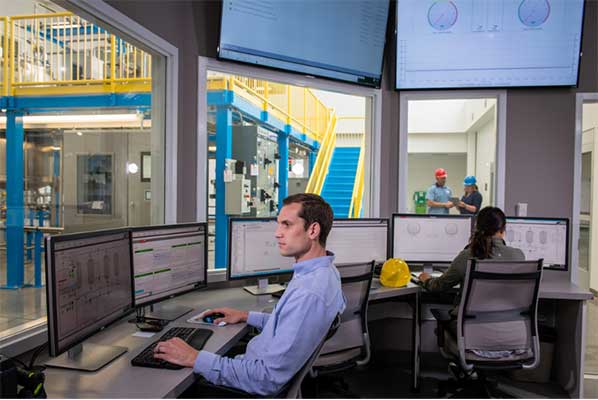Evolving industry landscapes have manufacturers using technologies like predictive AI to simplify, automate and improve current processes.
by Jordan Reynolds, Principal & Global Practice Leader, Data Science at Kalypso, a Rockwell Automation Business
The consumer-packaged goods (CPG) industry faces challenges of shortages in raw materials, disruptions along the supply chain and fluctuations in consumer spending and needs. Consumers have their own priorities for CPG companies, as most consumers want them to increase efficiency and eliminate material waste, according to a report from NielsenIQ.
To meet these challenges, it’s imperative manufacturers have access to innovative technologies that simplify, automate and optimize manufacturing processes. Recent data from the State of Smart Manufacturing Report found the top areas of manufacturing impacted by AI include quality (37%), automation (36%) and predictive approaches to operations and production capacity (32%). These are the same technologies CPG manufacturers can utilize to improve production and meet consumer expectations.

Much like previous manufacturing trends like lean six-sigma, smart manufacturing is a journey, not a destination. The theme of the journey is to get the right information to the right people at the right time in order to optimize important objectives like productivity, quality, risk management and sustainability. By simplifying and automating data analysis, CPG manufacturers can easily locate areas of improvement along the manufacturing process.
The first step in smarter manufacturing is determining the highest priority challenge. Once that is determined, researching and investing in the right analytical tools that drive efficiency, increased control and savings will result in a successful transformation process.
A smart manufacturing checklist should include:
As enterprises gain a deeper understanding of data, they can then adapt to make data more actionable and work to optimize productivity and profitability.
Advancements in technology and digital transformation have made it possible for enterprises to gather data from the entire organization. Once enterprises have access to limitless data, how can they know what information will actually be beneficial to their organization and how do they realize these benefits?
Data preparation is a major challenge as not all data has the same value, and incorrect predictions because of poor quality data can have serious repercussions. Feeding the right OT data into IT systems fuels accurate predictive AI, helping organizations avoid the potentially harmful impacts of poor predictions. Through automated IT/OT convergence, enterprises eliminate the need for substantial data engineering efforts when analysis is needed.
For example, a food and beverage packaging plant goes through multiple stages of production before it’s ready for consumers, such as filling, bottling, packaging, etc. Automatically capturing OT data context at each of these stages enables manufacturers to coordinate different production parameters to a specific batch number and document the origin of a production batch with specific temperature, pressure, packaging thickness, etc. Using this contextualized OT data, manufacturers can perform root cause analyses in real time without requiring heavy data engineering efforts. In the high-stress event of urgent safety recall issues, this allows manufacturers to easily deduce where the issue occurs, solve for it and use it as a reference point for continuous improvement efforts.
OT professionals are looking for rapid machine learning (ML) solutions that require minimal effort from data scientists or training to accelerate time to value. IT analysts and data scientists are looking for vigorous big data analytics and ML platform solutions that empower them to visually build, train, deploy, score and monitor ML models on an ongoing basis.
Consumer demands and expectations are constantly evolving and shifting, which leads to the challenge of continuously updating ML and AI models with new OT production data. The ability to understand and transform data at every step of the data pipeline minimizes the risk of error during execution, improves performance tracking and enables IT teams to accurately adjust models as needed.
Achieving positive and enduring change can only be done with a thoughtful approach. Without the right technologies or mindset in place, CPG leaders are missing out on the most valuable insights across their enterprise and therefore missing out on areas for growth. The industrial use of AI has drastically shifted the way manufacturers approach, think about and execute business processes. Specifically with predictive AI, manufacturers can analyze data from every point of the manufacturing process faster and potentially improve processes across the enterprise.

Jordan is a data scientist, management consultant and leading expert in digital transformation, bringing 15 years of professional experience to his clients.
Scott Ellyson, CEO of East West Manufacturing, brings decades of global manufacturing and supply chain leadership to the conversation. In this episode, he shares practical insights on scaling operations, navigating complexity, and building resilient manufacturing networks in an increasingly connected world.